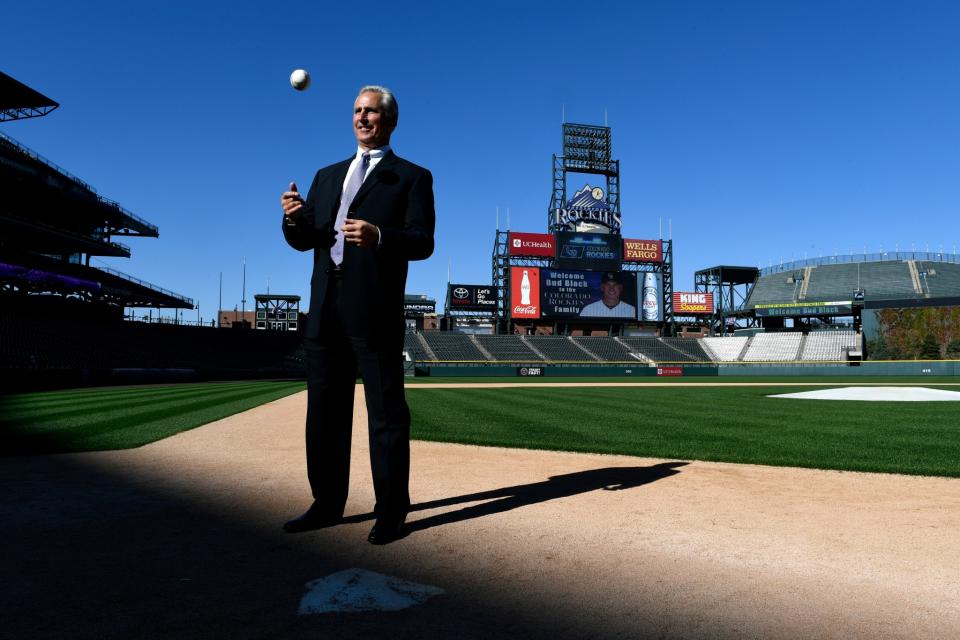Bud Black ready to conquer Colorado’s biggest obstacle

NATIONAL HARBOR, Md. – They all look the same on the way in or, as it were, on the way up. They are newly tasked with managing the pitching in Colorado, so like being put in charge of disentangling Slinkys while wearing oven mitts, and yet they are forever earnest in their optimism. That is the job and they are the men for that job, says so right on the contracts, and that is to turn the greatest hitters’ setting ever into something that more resembles baseball. And then, of course, winning baseball. For the Colorado Rockies. Way up in the sky.
Bud Black has seen the chaos. Felt the chaos.
“Nineteen-ninety-three,” he said. “Gave up two runs in the first inning.”
He had that look, which would land somewhere between bemused and, 23 years later, resting a lone pitch from disaster. The venue was Mile High Stadium, Black pitching for the San Francisco Giants, the Rockies playing their 20th home game in franchise history, more than 50,000 in the place.
Eric Young tripled, Joe Girardi singled. There was a balk. A walk. A very long fly ball. Stuff was happening. An inning like a million others over the years in a place where the greatest friction is not baseball against atmosphere, but manager’s palm against his own forehead, or perhaps pitcher’s career against the decline that leads to the certainty of the cliff.
They keep trying in Colorado, where they’ve seen seven winning seasons in 24, and also scored a ton of runs, and also given up way more, and into that walks Bud Black, the Rockies’ seventh manager, their first who has stood on a mound way up in the sky and hoped to survive that. Black is a smart and cool baseball man who ran a good shop in San Diego until, I don’t know, somebody down there ran out of things to do one day and fired Bud Black. In Colorado he’ll have some reasonably young and talented pitching that wasn’t a total disaster in 2016 (seventh in NL road ERA, 13th overall, the starters were OK, the relievers less so), that behind a team that was decent until early August, at which point it commenced to losing 34 of 55 games. It’s the relentlessness of the kind of baseball they play there, I’m convinced, that leads to bleary eyes and heavy legs and wandering souls. When not disentangling Slinkys, he’ll be herding souls.
“The true pitching fundamentals, if you don’t adhere to those, they are exposed more in Colorado,” Black said Monday. “First pitch strikes, staying ahead in the count, avoiding walks, don’t beat yourself, do what you have to do as a pitcher in all phases to be successful. Because mistakes, whether they are not fielding your position, not controlling the running game, pitching behind the count, a bad walk, all those things come up, will bite you more. Because one swing from a number of players in the lineup can get you.
“So if you minimize those over the course of 750 innings of, basically, a home season, a home regular season, you should have success. And you have to have the pitchers from a talent standpoint to be able to do that, and that’s where I think that we’re getting to.
“But specifically, when I was coming in as a visiting team, it was, hey, don’t walk anybody, not don’t keep the ball down, if you’re a high-ball pitcher that you’ve had success throwing the ball up in the zone, Chris Young, others, hey, pitch your game. You can’t pitch tentative in Coors Field.”
They all say it. They all look the same when they say it. They all believe it, probably, that there’s a way and that way can be seeded and harvested and replicated, that there are men who can pitch there and be great or at least good enough, that it doesn’t have to be a daily tumble into the wood chipper.

“Besides the talent, I think there’s a mental toughness that you really have to identify,” Black said. “I think there’s a mental component that has to be strong. And, you know, there are 350 major league pitchers, and they are all sort of built differently, mentally and physically. And we have to find those guys, of the 350, and even the 2,500 minor league pitchers, we have to identify those guys that have that ability, mentally tough, to be able to handle the adversity that happens there.
“You know, a three-day stretch as a visiting team, you don’t see that as much. I saw a little bit. I saw certain players, over nine years, in however many games I managed there, 60, 80, whatever it was, that had a tough time. Other guys, it depends on the player. You have to get the right player.”
So that’s the plan, same as the other plans, led this time by a man who’s been there. He’s skilled at this and maybe that’s the difference. His chance to promote change and courage and competency is as good as any, better than most, and now all that’s left is to throw the pitch and live with the result, then throw the next.
That day back in 1993? Bud Black did allow two runs in the first inning. Then he threw seven shutout innings. He walked one batter. He got 16 fly-ball outs. The Giants won, 8-2. So, yeah, just keep doing that.
“If we got access to that game, in this day and age,” he said, smiling, “could we pull that up?”

 Yahoo Sports
Yahoo Sports 
